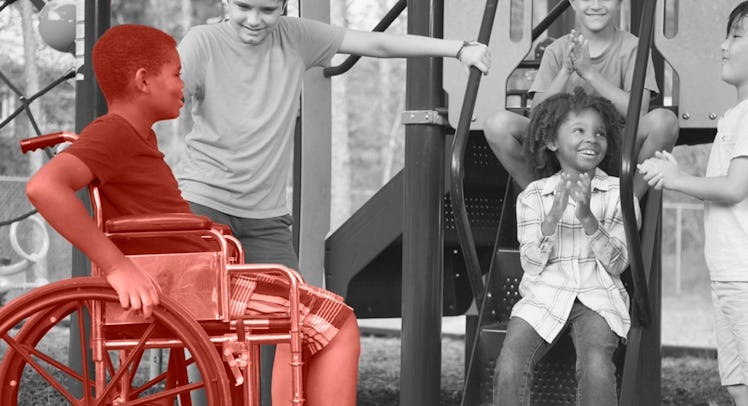Teach Your Kids Not to Get Weird Around Disabled People
Kids generally don’t have hang-ups about differently-abled people – but their parents can, even if they don’t mean to.

Most parents, one would hope, want to raise functional, well-adjusted kids. That process is fairly involved. It necessitates teaching manners, cultivating emotional intelligence, encouraging pro-social behaviors, and reinforcing the Golden Rule. But empathy is a weird thing and kids struggle to extend it to people that they can’t quite identify with. This leads to embarrassing behaviors, one of which it the tendency among kids to behave strangely toward disabled and differently-abled individuals. The reason why has everything to do with their parents.
“In my experience, more often than not, the discomfort around children’s curiosity lies with the adults,” explains Jennifer Theriault, a Connecticut psychotherapist with a specialty in families with differently-abled children and the mother of a child with cerebral palsy. “Adults are often concerned that their children will be rude or offensive, so they silence them or usher them away which really only increases their sense of discomfort. Children are inherently curious and I don’t think our goal should be to pretend that people aren’t different.”
It isn’t malicious, of course – parents usually want to avoid an uncomfortable situation, and so they go to lengths to prevent any sort of conversation whatsoever, or policing innocent questions too harshly. The problem, Theriault explains, is that when children are corrected for asking questions, they conclude that the whole situation is bad – so bad, it can’t even be talked about. This doesn’t do very much for reducing awkwardness or making kids comfortable, and at worst, it can create an unconscious bias. And from Theriault’s perspective, such sensitivity isn’t even necessary.
“I personally don’t feel offended when children ask [my son] why he is in a wheelchair, uses a computer to speak for him, etc. I use this as an opportunity to educate them about his disability and how it affects him. I also explain the many ways in which he is similar to them – he likes the same TV shows, enjoys spending time with friends, and so on.”
How to Teach a Child to Treat a Differently-Abled Person as an Individual
- Don’t make it a big deal: kids can tell when their parents are nervous or on edge, even if it is due to the unpredictability of a child’s questions.
- Don’t make assumptions: differently-abled kids may not have expressive language or want to make eye contact. That doesn’t mean they should be ignored.
- Manners are manners: the rules of good manners don’t change. Nobody likes to be stared at, interrupted, called names or talked about as if they aren’t there.
- Questions are okay: parents should answer questions directed to them, and not scold a child for asking innocent questions of others.
Parents should answer questions directed to them honestly and thoroughly. Some may be obvious – like asking if a disability is contagious – and some may be insightful. In many instances, kids may have already made differently-abled friends. As Theriault notes, many schools have inclusive classrooms and children with disabilities are mainstreamed, so children are much more exposed to people with disabilities than their parents were as children.
RELATED: Common Diagnostic Mimics that Can be Confused for Autism Spectrum Disorders
However, kids being kids, they may drift into universally impolite behaviors, like staring, or even cruel behaviors, like name calling. And when that happens, parents should treat it like any other learning opportunity. After all, those behaviors are rude to do to anyone.
“The best advice I have for adults is to remember that our children learn from what they see us doing more than what we say,” recommends Theriault. “The more people learn about, understand, and see people with disabilities as people first, and not defined by their disability, the better able they will be to connect with them.”
This article was originally published on